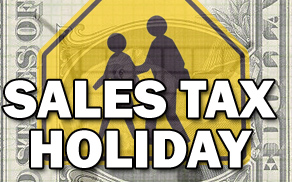Sales Tax Holiday Continues (With Printable List Of Exempt Items)
August 14, 2010
Florida’s 2010 Sales Tax Holiday is continuing until midnight Sunday, offering shoppers the chance to stock up on school supplies and clothing without paying sales tax.
 After a two-year hiatus, consumers are excited about the return of a holiday that provides a break at the cash register for families during a time of year when their expenses climb.
After a two-year hiatus, consumers are excited about the return of a holiday that provides a break at the cash register for families during a time of year when their expenses climb.
Retailers across Northwest Florida are gearing up for a big weekend, stocking up on merchandise and planning for a boost to their bottom line. In addition to locals, retailers are expecting to see a lot of Alabama tags in their parking lots as Alabama residents cross the state line to save a few extra dollars this weekend.
In general, Florida’s sales tax holiday will apply to the sale of books, clothing, wallets, or bags, including handbags, backpacks, fanny packs, and diaper bags, but excluding briefcases, suitcases, and other garment bags, having a sales price of $50 or less, or on sales of certain school supplies having a sales price of $10 or less for the period from 12:01 a.m., August 13, 2010, until midnight, August 15, 2010, according to the Florida Department of Revenue.
For complete details on exempt items in Florida, click here (pdf).
Florida defines books as “a set of printed sheets bound together and published in a volume.” Newspapers, magazines, other periodicals and audio books are not books and will be taxable during the holiday.
 Clothing is defined as any article of wearing apparel, including all footwear (except skis, swim fins, roller blades and skates) intended to be worn on or about the body. Clothing does not include watches, watchbands, jewelry, umbrellas, handkerchiefs or sporting equipment.
Clothing is defined as any article of wearing apparel, including all footwear (except skis, swim fins, roller blades and skates) intended to be worn on or about the body. Clothing does not include watches, watchbands, jewelry, umbrellas, handkerchiefs or sporting equipment.
School supplies include pens, pencils, erasers, crayons, notebooks, notebook filler paper, legal pads, binders, lunch boxes, construction paper, markers, folders, poster board, composition books, poster paper, scissors, cellophane tape, glue, paste, rulers, computer disks, protractors, compasses and calculators.
The state also has a rule about where purchases can be made or, more importantly, where they can’t be made.
For example, eligible items are not exempt from sales tax if purchased at a theme park or entertainment complex. So, a T-shirt with a cartoon character on the front purchased at Disney World would be taxable, although a similar T-shirt purchased at a department store would be exempt.
Eligible items also lose their tax-exempt status if purchased at a public lodging establishment, aka a hotel, motel, resort, beach cottage, or airport.



Comments